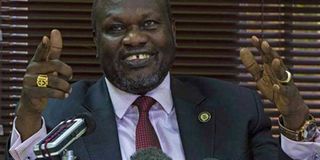Rebels reject Igad conditions for Riek Machar's freedom

South Sudan's rebel leader Riek Machar at a press conference in Kampala on January 26, 2016.Rebels oppose conditions Igad imposed on him to secure his release from house arrest. PHOTO | ISAAC KASAMANI | AFP
What you need to know:
- Accused of stalling the peace process, including the failed implementation of a peace agreement signed in August 2015, Dr Riek Machar had fled South Sudan before being put under house arrest in Pretoria, South Africa.
- But it was only until this week that Igad formally admitted having a hand in the house arrest.
- South Sudan rebels want Machar allowed to travel wherever he wants and without conditions.
South Sudan rebels have rejected conditions imposed on their leader Riek Machar for him to be released from house arrest, signalling another round of continued conflict.
Henry Dilah Odwar, the deputy chairman of the Sudan People’s Liberation Army in Opposition (SPLM/IO), said the group wants Dr Machar allowed to travel wherever he wants and without conditions.
OPPOSE
“We are disappointed by the decision by the Council of Ministers of singling out the Chairman of the SPLM/IO and asking him not to obstruct peace when his delegation is engaging in peace talks which reflects his commitment and blessing,” he said in an open letter sent to the new Ethiopian Prime Minister Abiy Ahmed Ali.
“Based on the facts as mentioned above, it is clear that Dr Riek Machar is a subject of personal targeting in these Igad decisions.
“We cannot help but wonder as to what the motives are that inform Igad’s decisions because it is obvious that they have nothing to do with the peace process.”
On March 26, the Council of Ministers from the eight-member countries of the regional political bloc the Intergovernmental Authority on Development (Igad), gathered in Addis Ababa, Ethiopia, and agreed to lift a house arrest imposed on SPLM/IO leader Riek Machar as long as he renounces violence, does not obstruct the peace process and does not travel or stay in any of the countries that neighbour South Sudan.
DECISION
Accused of stalling the peace process, including the failed implementation of a peace agreement signed in August 2015, Dr Machar had fled South Sudan before being put under house arrest in Pretoria, South Africa.
But it was only until this week that Igad formally admitted having a hand in the house arrest.
Igad includes Kenya, Uganda, Ethiopia, Sudan, South Sudan, Somalia and Djibouti. Eritrea is also a member but rarely attends the meetings and has previously been suspended.
REBELS
The rebels reject Igad's conditions, arguing that Dr Machar, a former Vice President in South Sudan, is still an important person for the peace talks.
The rebels claim Igad was being biased in negotiating for peace by targeting to sanction rebels while looking the other way when the government of President Salva Kiir commits war crimes and frustrates the peace process.
Specifically, they charge that Kiir’s government has refused to sign the Declaration of Principles (DoP), a documents fronted by Igad to restart a renegotiation for peace.
Also, the group accuses the South Sudan government of disrespecting the Cessation of Hostilities signed early in January to allow peace talks.
“We have signed the Cessation of Hostilities Agreement and we have signed the Declaration of Principles but the government declined. Are we the ones obstructing peace? So I think the Igad Council of Ministers has missed the point,” Odwar said.
“There are no legal grounds for the house arrest of Riek Machar and we totally reject the house arrest and the proposed relocation to another country for a new house arrest.”
RESTRICTIONS
South Sudan’s Ambassador to the AU, James P Morgan, said his government supports Igad’s position because Machar had frustrated previous peace bids.
He told the Nation that Machar’s role should be restricted to holding consultations with his delegates to the talks, but not taking part in person.
“He has made a declaration of war so we think he should not be in South Sudan. He is always inciting the fighters,” Mr Morgan said.
“He will play the role of being consulted.”





